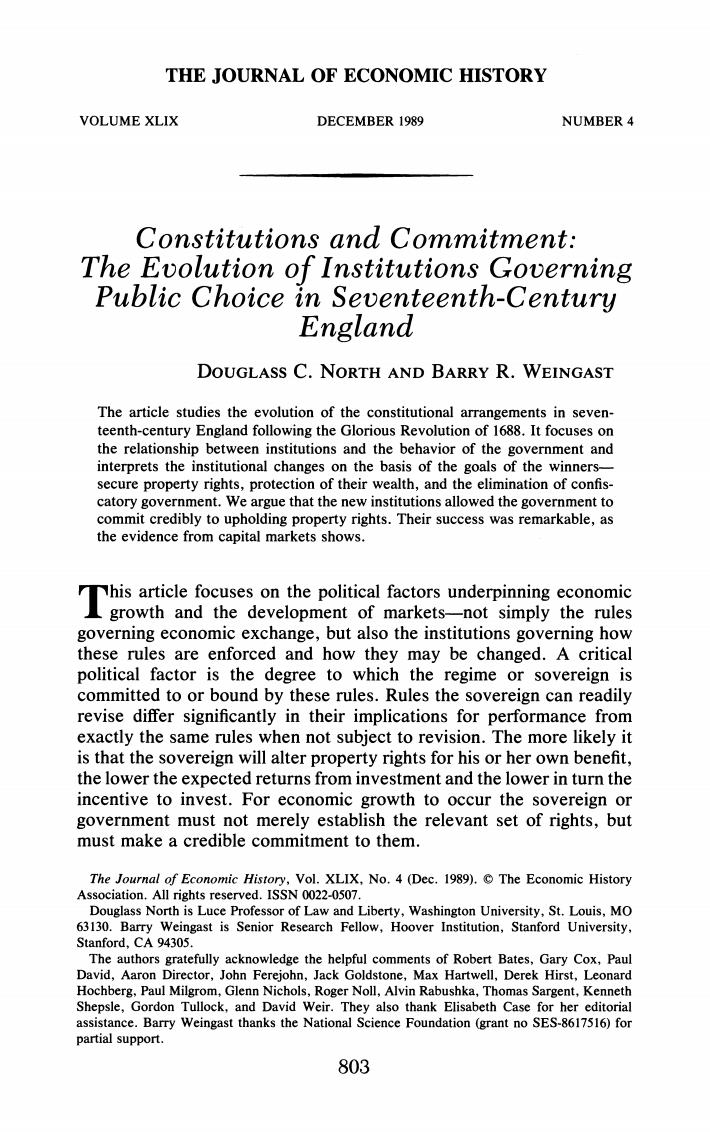正在加载图片...

THE JOURNAL OF ECONOMIC HISTORY VOLUME XLIX DECEMBER 1989 NUMBER 4 Constitutions and Commitment: The Evolution of Institutions Governing Public choice in Seventeenth-Century England DOUGLASS C.NORTH AND BARRY R.WEINGAST The article studies the evolution of the constitutional arrangements in seven- teenth-century England following the Glorious Revolution of 1688.It focuses on the relationship between institutions and the behavior of the government and interprets the institutional changes on the basis of the goals of the winners- secure property rights,protection of their wealth,and the elimination of confis- catory government.We argue that the new institutions allowed the government to commit credibly to upholding property rights.Their success was remarkable,as the evidence from capital markets shows. e evelnmehe le governing economic exchange,but also the institutions governing how these rules are enforced and how they may be changed.A critical political factor is the degree to which the regime or sovereign is committed to or bound by these rules.Rules the sovereign can readily revise differ significantly in their implications for performance from exactly the same rules when not subject to revision.The more likely it is that the sovereign will alter property rights for his or her own benefit, the lower the expected returns from investment and the lower in turn the incentive to invest.For economic growth to occur the sovereign or government must not merely establish the relevant set of rights,but must make a credible commitment to them. The Journal of Economic History,Vol.XLIX,No.4(Dec.1989).The Economic History Association.All rights reserved.ISSN 0022-0507. Douglass North is Luce Professor of Law and Liberty,Washington University,St.Louis,MO 63130.Barry Weingast is Senior Research Fellow,Hoover Institution,Stanford University, Stanford,CA 94305. The authors gratefully acknowledge the helpful comments of Robert Bates,Gary Cox,Paul David,Aaron Director,John Ferejohn,Jack Goldstone,Max Hartwell,Derek Hirst,Leonard Hochberg,Paul Milgrom,Glenn Nichols,Roger Noll,Alvin Rabushka,Thomas Sargent,Kenneth Shepsle,Gordon Tullock,and David Weir.They also thank Elisabeth Case for her editorial assistance.Barry Weingast thanks the National Science Foundation (grant no SES-8617516)for partial support. 803THE JOURNAL OF ECONOMIC HISTORY VOLUME XLIX DECEMBER 1989 NUMBER 4 Constitutions and Commitment: The Evolution of Institutions Governing Public Choice in Seventeenth-Century England The article studies the evolution of the constitutional arrangements in seventeenth-century England following the Glorious Revolution of 1688. It focuses on the relationship between institutions and the behavior of the government and interprets the institutional changes on the basis of the goals of the winnerssecure property rights, protection of their wealth, and the elimination of confiscatory government. We argue that the new institutions allowed the government to commit credibly to upholding property rights. Their success was remarkable, as the evidence from capital markets shows. This article focuses on the political factors underpinning economic growth and the development of markets-not simply the rules governing economic exchange, but also the institutions governing how these rules are enforced and how they may be changed. A critical political factor is the degree to which the regime or sovereign is committed to or bound by these rules. Rules the sovereign can readily revise differ significantly in their implications for performance from exactly the same rules when not subject to revision. The more likely it is that the sovereign will alter property rights for his or her own benefit, the lower the expected returns from investment and the lower in turn the incentive to invest. For economic growth to occur the sovereign or government must not merely establish the relevant set of rights, but must make a credible commitment to them. The Journal of Economic History, Vol. XLIX, No. 4 (Dec. 1989). O The Economic History Association. All rights reserved. ISSN 0022-0507. Douglass North is Luce Professor of Law and Liberty, Washington University, St. Louis, MO 63130. Barry Weingast is Senior Research Fellow, Hoover Institution, Stanford University, Stanford, CA 94305. The authors gratefully acknowledge the helpful comments of Robert Bates, Gary Cox, Paul David, Aaron Director, John Ferejohn, Jack Goldstone, Max Hartwell, Derek Hirst, Leonard Hochberg, Paul Milgrom, Glenn Nichols, Roger Noll, Alvin Rabushka, Thomas Sargent, Kenneth Shepsle, Gordon Tullock, and David Weir. They also thank Elisabeth Case for her editorial assistance. Barry Weingast thanks the National Science Foundation (grant no SES-8617516) for partial support